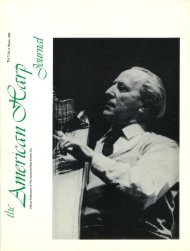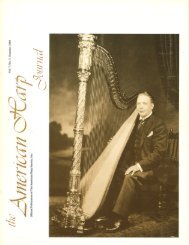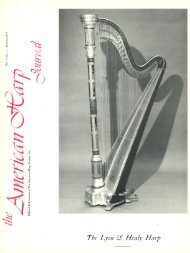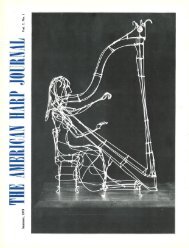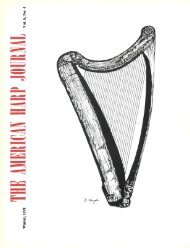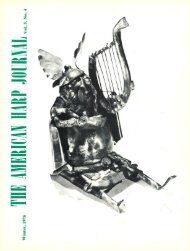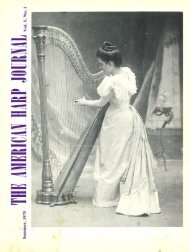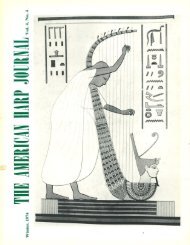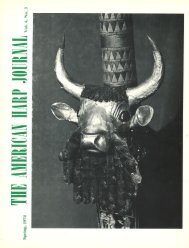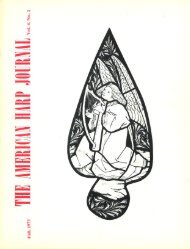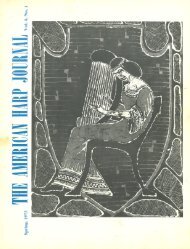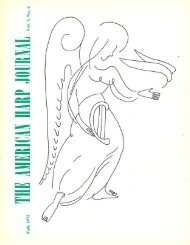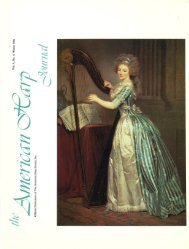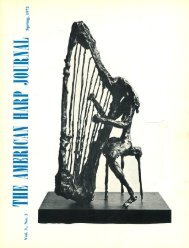You also want an ePaper? Increase the reach of your titles
YUMPU automatically turns print PDFs into web optimized ePapers that Google loves.
for his wife. Further, Tristram was commanded to go to<br />
Ireland to ask for her hand and to bring her back.<br />
On his way to Ireland, Tristram had the opportunity<br />
of defending the honor of King Angwyshaunce in combat.<br />
As a token of his gratitude, King Angwyshaunce<br />
offered Tristram anything he desired. To the king's<br />
surprise Tristram asked for the hand of Iseult, not for<br />
himself, but for his uncle, King Mark. King Angwyshaunce<br />
cried out, "Alas, Sir Tristram! I had hoped that<br />
it would be for yourself that you would ask her hand."<br />
Tristram replied, "Sire, in honoring my pledge to my<br />
uncle, I betray my own vows to Iseult, but still I have to<br />
ask for her hand for him."<br />
Whereupon King Angwyshaunce said, "Sir Tristram,<br />
you shall have her; and whether you keep her for yourself<br />
or yield her to King Mark, must be a matter of<br />
your own choice."<br />
Setting sail for Cornwall with their servants, Tristram<br />
and Iseult, during the voyage, found a golden flask,<br />
and believing it some rare wine, drank what was indeed<br />
a love potion intended for the wedding night of Iseult<br />
and King Mark. The magic potion induced a fatal passion<br />
in the two young people for each other, and although<br />
Iseult must marry King Mark, the two, caught<br />
in the bonds of the love potion, would in their future<br />
lives never cease to love one another.<br />
Delivering lseult to her betrothed, King Mark, Tristram,<br />
suffering greatly, parted from her and looking<br />
back with longing at Tintagil, the castle of King Mark,<br />
turned away and again went forth as required by his<br />
knighthood. He was to return many times to lseult and,<br />
according to the custom of Arthur's court, to defend her<br />
honor in knightly combat, but he could never remain<br />
with her.<br />
There was a time when Sir Tristram mistakenly<br />
assumed that lseult had given her love to another and,<br />
distraught and uncaring, had fled to the forest. Abandoning<br />
his horse and his armour, he had walked, unconscious<br />
of anything but the pain in his heart, through<br />
the wilderness with thorns and branches tearing at his<br />
hair and clothes, until, exhausted, he fell on the ground<br />
where he was found by crude peasants. A young noblewoman<br />
had pitied him in his plight and had followed<br />
him to try and comfort him. She brought him food and<br />
wine but he refused to eat or drink. Then bringing her<br />
harp, she played to him; whereupon, in sweet recognition,<br />
he came to her, took the harp and played upon it<br />
comforting himself with its sound. For many months he<br />
lived in this manner. He became lean, and his clothes<br />
became rags.<br />
At Tintagil, lseult, hearing a rumour that Tristram<br />
was dead, became wild with grief, and taking a sword<br />
ran with it into her garden. Driving the sword up to the<br />
hilt through the slender trunk of a plum tree at breast<br />
height, she prepared to fling herself on it while she tearfully<br />
prayed, "Sweet J esu, have mercy on my soul, for<br />
how can I bear to outlive Tristram?"<br />
King Mark, however, came to her quickly and prevented<br />
her from destroying herself. She was taken tenderly<br />
back into the castle; but thereafter, lseult refused<br />
26<br />
to leave her room and lay grief stricken and on the point<br />
of death.<br />
A little later the king received work of a madman in<br />
the forest and he commanded his knights to bring the<br />
creature to the castle. The knights, finding a demented,<br />
staring man wandering in the woods, seized him and<br />
brought him back to Tintagil. He was washed and fed,<br />
but was unknown to any of them. However, when lseult<br />
saw him, she said, "How strange! He seems familiar yet<br />
I do not recognize him."<br />
The man, seeing Iseult, turned aside his head and<br />
wept. At that moment, lseult's brachet hound suddenly<br />
bounded forward and leaping up at the stranger began<br />
to joyfully lick his hands and face. <strong>No</strong>w, as the brachet<br />
had never allowed any other person than lseult or Tristram<br />
to go near it, one of the servants, remembering,<br />
exclaimed, "My lady! It is Sir Tristram."<br />
lseult fainted and for a long time lay as though dead.<br />
Then she recovered and said, "My own dear lord, Sir<br />
Tristram! I thank God that you are still alive. But my<br />
love, I fear for you; this brachet will betray you, and as<br />
soon as King Mark discovers who you are, he will exile<br />
you forever, if he does not kill you, for he is jealous<br />
of our love. Therefore, I beg you, do not oppose him,<br />
but go to King Arthur's court, where you are highly<br />
regarded, and whenever it is possible for me to see you,<br />
I shall do so; my life as a queen is lonely but rather than<br />
see you destroyed, I ask you to go.<br />
Tristram, knowing she spoke the truth, replied, "My<br />
lady, I go then. Your love has saved me from great<br />
danger."<br />
The painting by Sir Edward Burne Jones entitled<br />
"The Madness of Sir Tristram", shows Tristram in the<br />
forest dressed in rags, his hair cut like that of a fool,<br />
barefooted, seated on the ground playing on a harp. The<br />
legend at the top of the painting says: "So would Sir<br />
Tristram come unto that harp and listen to the sound<br />
thereof and sometimes would harp himself. Thus he remained<br />
there a quarter of a year." A young woman<br />
stands to one side listening, probably the one who followed<br />
him into the forest and who brought him her<br />
harp. A herdsman is shown asleep and a man in hunting<br />
cloak and hat stands watching with his dog at his side.<br />
Sir Edward Burne-Jones (1833-1898), as a young<br />
man at Exeter College, Oxford University, England,<br />
first read MORTE D'ARTHUR with his good friend<br />
William Morris. Reading this book was to influence<br />
Burne-Jones greatly in his future work. Meeting the<br />
great romantic painter Dante Gabriel Rossetti, whose<br />
work he admired tremendously, and the encouragement<br />
of Rossetti decided Burne-Jones to change his field of<br />
study from that of preparing for the church to that of<br />
being a painter and designer. The delicacy of style and<br />
choice of subject matter in the work of Burne-Jones<br />
attracted many admirers and his thorough grounding<br />
in the classics provided him with endless_ inspiration.<br />
His work made him popular and successful and he was<br />
made a baronet by the queen in 1894. His philosophy<br />
of painting is best expressed in his own words: "I mean<br />
by a picture a beautiful, romantic dream of something<br />
AMERICAN HARP JOURNAL




